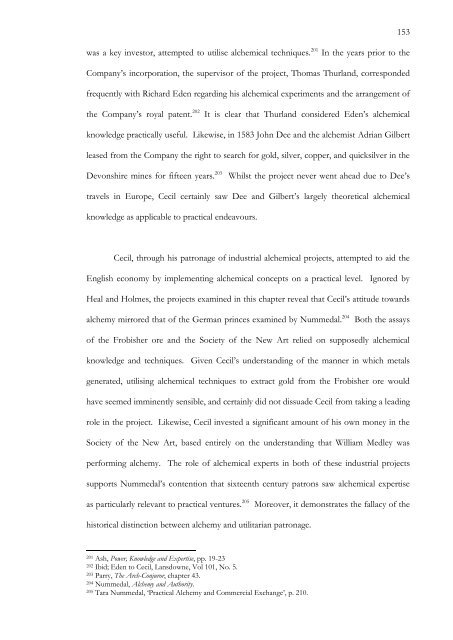The Alchemical Patronage of Sir William Cecil, Lord Burghley
The Alchemical Patronage of Sir William Cecil, Lord Burghley
The Alchemical Patronage of Sir William Cecil, Lord Burghley
Create successful ePaper yourself
Turn your PDF publications into a flip-book with our unique Google optimized e-Paper software.
was a key investor, attempted to utilise alchemical techniques. 201 In the years prior to the<br />
Company‘s incorporation, the supervisor <strong>of</strong> the project, Thomas Thurland, corresponded<br />
frequently with Richard Eden regarding his alchemical experiments and the arrangement <strong>of</strong><br />
the Company‘s royal patent. 202 It is clear that Thurland considered Eden‘s alchemical<br />
knowledge practically useful. Likewise, in 1583 John Dee and the alchemist Adrian Gilbert<br />
leased from the Company the right to search for gold, silver, copper, and quicksilver in the<br />
Devonshire mines for fifteen years. 203 Whilst the project never went ahead due to Dee‘s<br />
travels in Europe, <strong>Cecil</strong> certainly saw Dee and Gilbert‘s largely theoretical alchemical<br />
knowledge as applicable to practical endeavours.<br />
<strong>Cecil</strong>, through his patronage <strong>of</strong> industrial alchemical projects, attempted to aid the<br />
English economy by implementing alchemical concepts on a practical level. Ignored by<br />
Heal and Holmes, the projects examined in this chapter reveal that <strong>Cecil</strong>‘s attitude towards<br />
alchemy mirrored that <strong>of</strong> the German princes examined by Nummedal. 204 Both the assays<br />
<strong>of</strong> the Frobisher ore and the Society <strong>of</strong> the New Art relied on supposedly alchemical<br />
knowledge and techniques. Given <strong>Cecil</strong>‘s understanding <strong>of</strong> the manner in which metals<br />
generated, utilising alchemical techniques to extract gold from the Frobisher ore would<br />
have seemed imminently sensible, and certainly did not dissuade <strong>Cecil</strong> from taking a leading<br />
role in the project. Likewise, <strong>Cecil</strong> invested a significant amount <strong>of</strong> his own money in the<br />
Society <strong>of</strong> the New Art, based entirely on the understanding that <strong>William</strong> Medley was<br />
performing alchemy. <strong>The</strong> role <strong>of</strong> alchemical experts in both <strong>of</strong> these industrial projects<br />
supports Nummedal‘s contention that sixteenth century patrons saw alchemical expertise<br />
as particularly relevant to practical ventures. 205 Moreover, it demonstrates the fallacy <strong>of</strong> the<br />
historical distinction between alchemy and utilitarian patronage.<br />
201 Ash, Power, Knowledge and Expertise, pp. 19-23<br />
202 Ibid; Eden to <strong>Cecil</strong>, Lansdowne, Vol 101, No. 5.<br />
203 Parry, <strong>The</strong> Arch-Conjuror, chapter 43.<br />
204 Nummedal, Alchemy and Authority.<br />
205 Tara Nummedal, ‗Practical Alchemy and Commercial Exchange‘, p. 210.<br />
153















